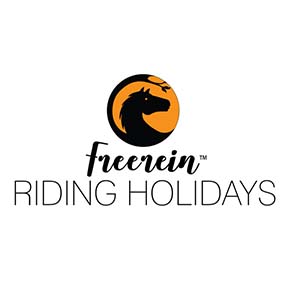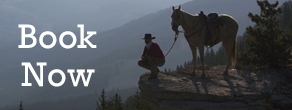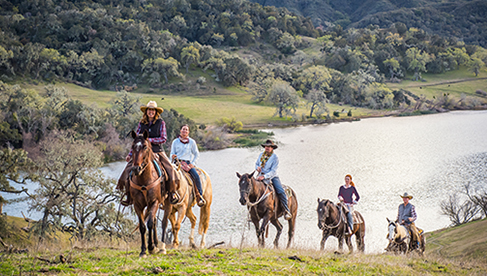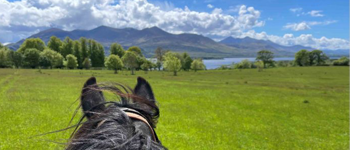Wyoming- T Cross Ranch
Embracing life away from modern technology at the T Cross Ranch, a historic Wyoming dude ranch.
by Darley Newman
I take a deep breath and stare at the glacier-capped Wind River Mountains. My Quarter Horse Hank has probably seen this view a hundred times, but he stands quietly while I try to take it all in. I’m at Wyoming’s T Cross Ranch, riding out amongst the low sagebrush and honey colored grass and feeling at peace with the world.
My cell phone can’t intrude because it doesn’t work here. I don’t need to check my email and there is no pressure to hurry back to the ranch for the 6 o’clock news. The absence of these modern trappings forces me to focus on other things, like the feel of mountain air in my lungs and the towering glacier sparkling in front of me in the distance.

"People that come to dude ranches have a curiosity about what was,” says Ken Neal, who recently retired and turned the day-to-day ranch work over to his kids. Neal’s memory of ranch life stretches back to when he was four years old. “Fortunately we still have some area left that shows what it was like."
Ken’s obvious love of the surrounding land gets me thinking about what travelers are seeking when they venture out to the remaining authentic guest ranches of the West.
Entering my cabin at T Cross, I’m struck by the effect of the natural light and cool mountain air drifting in through the open window. The family at T Cross use original material when replacing and repairing broken structures, like the wooden latch on the door I’d just opened. This kind of attention to detail takes a lot more work. But the extra care allows T Cross to remain much as it was in the late 1800’s when it was homesteaded by a fugitive from the Johnson County Cattle Wars. I fully appreciate this work when I lie down to sleep in a bedroom that has remained virtually unchanged for 100 years. The feel of the wood bed frame and the subtle aroma of pine lull me to sleep.
"I find that people come and all of a sudden after three days they relax and they start to enjoy life, because they can't get a lot of outside information,” says Neal. “It's not available and they quit looking for it. It's a wonderful thing."

In true T Cross style I see many of the guests embracing an off-line lifestyle, doing absolutely nothing save rocking in a chair on their porch and starring at the horses in the pasture. The easy going smiles prove their satisfaction. I decide to postpone idle bliss for a few more hours and ride out into the unknown.
I always feel like a modern day explorer when I’m conquering a new area on horseback. In most cases, I know that I’m not the first one to ride that trail or go through that mountain pass, but when an ant colony is the closest I come to civilization for hours at a time, the rest of the world fades from my mind. Maybe this is how the Shoshone Indians and Lewis and Clark felt when they rode the lands around T Cross, when America was in its infancy.
Many of our nation's ranches are shrinking, remodeling, or flat out selling. The ranches where generations of families rode in the footsteps of homesteaders and Western legends are being threatened. Some ranches fight extinction by broadening their appeal with modern amenities like luxury spas. Inviting as these spas may be, finding those precious ranches where life is faithfully Western is becoming more and more difficult.

At the spa-free T Cross Ranch, riding and fly-fishing are my main activities. My attempt at fly-fishing is only moderately successful. I catch one small, shiny Cutthroat Trout. It’s catch and release, so I let my fish swim for another day, though I could have cooked him up for dinner or even breakfast. Cutthroat Trout, Brook Trout, Rainbow Trout, Mountain White Fish and the occasional Brown Trout can all be found in the waters nearby.
Other visitors, the ones that sought history rather than a well stocked stream, took a drive along the long, unpaved road to the town of Dubois, along the Wind River. Dubois is on an old trapper route. Kit Carson and Jim Bridger passed through the town in the 1800's, and Butch Cassidy followed later on. The Dubois Museum shows a glimpse of life back thousands of years before the west was settled, complete with stone tools and glyphs of mysterious, long-gone, inhabitants who lived in the area. I, however, am content to finally succumb to blissful idleness and watch the Wyoming sun set in the distance.
There's a certain freedom in visiting a place, in today's interconnected world, where you can disconnect, ride all day, and appreciate the beauty of the land and its history. Ranches like T Cross and our national parks help protect these vast and untamed lands so that we riders and travelers can quell our curiosity about the past while getting away from the unending demands of our modern lives.
Learn more about horse riding vacations at T Cross Ranch in the Equitrekking Vacation Guide and on T Cross Ranch's website.




